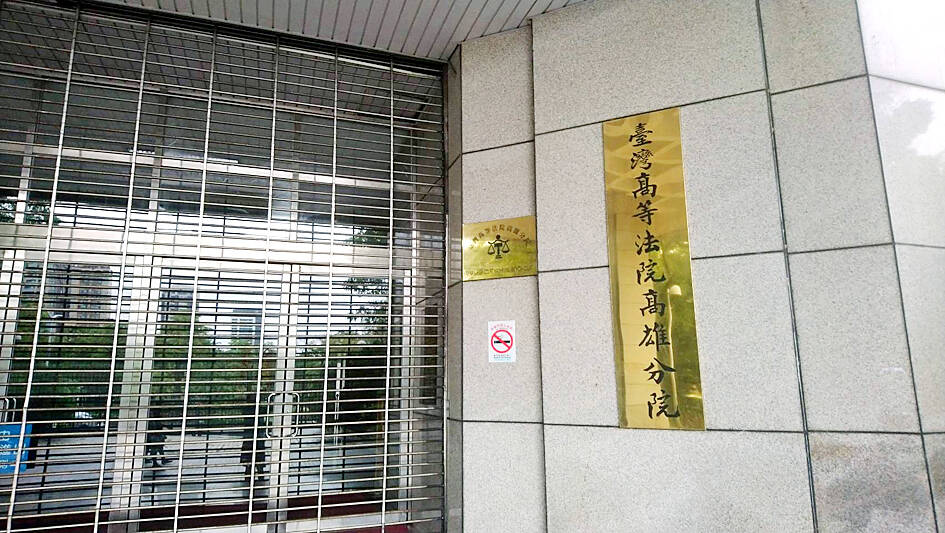The Kaohsiung branch of the High Court yesterday ruled that state compensation should be paid for the accidental death of a Chinese tourist, as citizens of the People’s Republic of China are regarded as Republic of China (ROC) nationals under the law.
The Kaohsiung City Government should pay NT$4.63 million (US$152,283) to the family of the man, surnamed Qian (錢), the court said.
The ruling can be appealed.

Photo: Pao Chien-hsin, Taipei Times
Qian was electrocuted to death by a malfunctioning street light while cycling in Kaohsiung’s Lujhu District (路竹) during a round-the-island biking tour in August 2018 — a fact that the city government does not dispute.
The family sued the city for wrongful death and demanded NT$11.65 million in compensation for pain and suffering, loss of income, funeral costs and other expenses.
Foreign nationals can receive reparations for government negligence resulting in death or injury if a reciprocal arrangement exists between Taiwan and their country of origin, the branch’s first civil court president Ning Hsin (甯馨) said, citing the State Compensation Act (國家賠償法).
The claims made by the deceased’s family would have been rejected, as there is no reciprocal agreement between the Taiwanese and Chinese governments, but the laws accord a special legal status to the latter, she said, referring to the Act Governing Relations Between the People of the Taiwan Area and the Mainland Area (臺灣地區與大陸地區人民關係條例).
The court requested clarification about the State Compensation Act in reference to the Qian case from the Ministry of Justice and the Mainland Affairs Council, which issued an official statement saying Chinese citizens are deemed ROC nationals under the law, Ning said.
As such, the court ruled in favor of Qian’s family in accordance with the State Compensation Act, she said.
The Kaohsiung City Government expressed regret over the court’s ruling and said officials would mull its next step after receiving the verdict.
The Kaohsiung Legal Affairs Bureau said it had appealed the first trial’s favorable verdict for Qian’s family on the grounds that, as the deceased was not Taiwanese, the state compensation law did not apply.
The bureau respects the court’s decision and would discuss the matter with the Kaohsiung Public Works Bureau, it said.
The Ministry of Justice said its clarification for the court was made according to the Council of Grand Justices’ Decision No. 16337 1993, which allows state compensation claims to be made for wrongful death or injury of people from China.
The ministry has proposed amendments to the State Compensation Act to allow reparation claims to be made for all victims of government negligence regardless of nationality, as placing preconditions on such claims runs counter to international law, it said.
The Executive Yuan approved the draft act in September 2021, but lawmakers have yet to pass the bill, the ministry said.

‘DENIAL DEFENSE’: The US would increase its military presence with uncrewed ships, and submarines, while boosting defense in the Indo-Pacific, a Pete Hegseth memo said The US is reorienting its military strategy to focus primarily on deterring a potential Chinese invasion of Taiwan, a memo signed by US Secretary of Defense Pete Hegseth showed. The memo also called on Taiwan to increase its defense spending. The document, known as the “Interim National Defense Strategic Guidance,” was distributed this month and detailed the national defense plans of US President Donald Trump’s administration, an article in the Washington Post said on Saturday. It outlines how the US can prepare for a potential war with China and defend itself from threats in the “near abroad,” including Greenland and the Panama

The Chinese Nationalist Party (KMT) is maintaining close ties with Beijing, the Democratic Progressive Party (DPP) said yesterday, hours after a new round of Chinese military drills in the Taiwan Strait began. Political parties in a democracy have a responsibility to be loyal to the nation and defend its sovereignty, DPP spokesman Justin Wu (吳崢) told a news conference in Taipei. His comments came hours after Beijing announced via Chinese state media that the Chinese People’s Liberation Army’s Eastern Theater Command was holding large-scale drills simulating a multi-pronged attack on Taiwan. Contrary to the KMT’s claims that it is staunchly anti-communist, KMT Deputy

RESPONSE: The government would investigate incidents of Taiwanese entertainers in China promoting CCP propaganda online in contravention of the law, the source said Taiwanese entertainers living in China who are found to have contravened cross-strait regulations or collaborated with the Chinese Communist Party (CCP) could be subject to fines, a source said on Sunday. Several Taiwanese entertainers have posted on the social media platform Sina Weibo saying that Taiwan “must be returned” to China, and sharing news articles from Chinese state media. In response, the Mainland Affairs Council (MAC) has asked the Ministry of Culture to investigate whether the entertainers had contravened any laws, and asked for them to be questioned upon their return to Taiwan, an official familiar with the matter said. To curb repeated

Myanmar has turned down an offer of assistance from Taiwanese search-and-rescue teams after a magnitude 7.7 earthquake struck the nation on Friday last week, saying other international aid is sufficient, the National Fire Agency said yesterday. More than 1,700 have been killed and 3,400 injured in the quake that struck near the central Myanmar city of Mandalay early on Friday afternoon, followed minutes later by a magnitude 6.7 aftershock. Worldwide, 13 international search-and-rescue teams have been deployed, with another 13 teams mobilizing, the agency said. Taiwan’s search-and-rescue teams were on standby, but have since been told to stand down, as